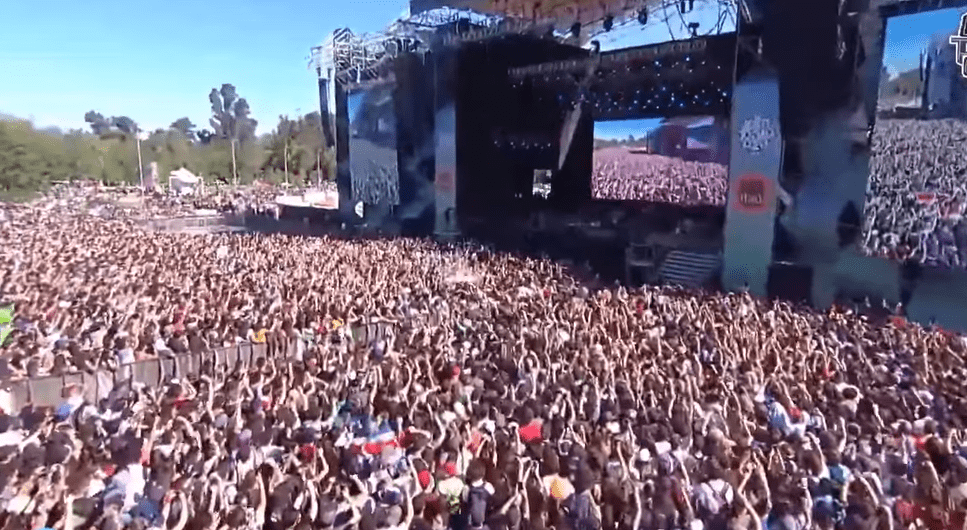It might seem like a quiet homecoming to return to Santiago after seven years away, but Mac DeMarco’s arrival has sparked an unprecedented amount of enthusiasm. Due to the overwhelming demand for tickets, Teatro Caupolicán added a second night for April 18–19, 2026, transforming the addition into a statement: this isn’t just a tour stop; it’s emotional territory reclaimed. The space is prepared to host not just a performance but also a private exchange between the performer and the audience, where low-fidelity resonance and gentle vocals are valued more highly than showmanship.
DeMarco appears to have a strong connection with Chile, which has become a center for indie music. Artists such as Tame Impala, Phoebe Bridgers, and Arctic Monkeys have found success there. His warm, occasionally clumsy, melodic style, which is anchored by low-fi textures and chorus-laden guitar lines, reflects a kind of innocuous rebellion that many Chilean listeners embrace. His brand of humorous vulnerability combined with melancholic slacker pop resonates remarkably naturally with the emotional undercurrents of Chile’s youth culture.
This return occurs at a critical juncture in DeMarco’s musical development. After releasing the extensive compilation One Wayne G, which has a total of 199 tracks and a duration of over nine hours, he is currently getting ready to release Guitar on August 22, 2025. The singles “Home” and “Holy” provide a glimpse of development; they are still lighthearted but emotionally astute. Before his worldwide rollout starts, fans will have a unique opportunity to witness the development of Santiago’s artistry as he is one of the first places to hear these new songs performed live.
Mac DeMarco – Personal and Professional Overview
| Field | Information |
|---|---|
| Full Name | McBriare Samuel Lanyon DeMarco |
| Birth Name | Vernor Winfield McBriare Smith IV |
| Birth Date | April 30, 1990 |
| Birthplace | Duncan, British Columbia, Canada |
| Origin | Edmonton, Alberta, Canada |
| Nationality | Canadian |
| Partner | Kiera McNally (2009–present) |
| Genre | Indie rock, slacker rock, psychedelic pop |
| Occupation | Musician, songwriter, producer |
| Active Years | 2008–present |
| Signature Albums | 2, Salad Days, This Old Dog, Here Comes the Cowboy, Five Easy Hot Dogs |
| Upcoming Album (2025) | Guitar (Release Date: August 22, 2025) |
| Official Website | www.macdemarco.com |

In 2018, he gave his final performance in Chile at Lollapalooza, which was caught on camera in a series of viral video clips that are still being shared on YouTube. The Teatro Caupolicán setting promises something more subdued but no less impactful—a space where riffs and lyrics feel like whispered letters between the performer and the audience—in contrast to those clips, which displayed unadulterated energy and loose spontaneity. Fans anticipate less chaos and more introspection, but with the same unpredictable nature that DeMarco enjoys.
Prices for tickets, which range from roughly CLP 43,700 to CLP 86,250, reflect both excitement and accessibility, making it possible for both new and loyal local fans to attend. Since the announcement, fan accounts like @macdemarcocl have seen an explosion in engagement, which has fueled both nostalgia and conjecture at the same time. The second date felt more like an affirmation—an artist going back to a place that had welcomed him wholeheartedly years earlier—than a marketing ploy.
As a new generation of indie musicians gravitate toward home-studio intimacy, emotional honesty, and lo-fi aesthetics, DeMarco’s influence becomes more noticeable. His playful and unconventional “jizz jazz” style is reflected in the music of up-and-coming musicians who defy established norms. Using a combination of homemade tape recording, vintage equipment, and a charmingly flawed vocal delivery, his style is incredibly adaptable without sacrificing its authenticity.
Both strategy and sentiment are evident in Guitar’s decision to launch his tour in South America. It honors devoted followers and demonstrates DeMarco’s respect for crowds that are frequently disregarded in international circuits. A deeper cultural exchange is highlighted by his tour leg through Chile, Argentina, and Brazil, where fans share not only songs but also emotional landscapes influenced by geography and life experiences.
DeMarco’s songs frequently explore the unsaid, such as awkward longing, identity aches, and nostalgia, and they poignantly transcend language barriers. As though they were composed locally, songs like “Let Her Go” and “Chamber of Reflection” reverberate through teenage bedrooms, Chilean cafés, and expansive coastal sunsets. His live presence, a force that is both familiar and unpredictable, feels more like a collective catharsis than a performance.
Fans even have made a myth out of DeMarco’s eccentricities, such as his marathon track releases, surprise BBQ album hotdog giveaways, and pins dropping into crowd jumps. These behaviors convey genuineness, impromptuness, and a rejection of formal marketing templates. These characteristics will cement the performances in Santiago in the audience’s memory, not as carefully staged spectacle but as actual experiences.
Mac DeMarco is a reminder of the value of genuine connection over viral calculation in a music industry that is increasingly influenced by social media metrics, algorithm pushes, and curated crowds. His impending release of Guitar and the emotional impact of seeing a responsive audience again highlight his return to Chile and demonstrate that some connections last beyond streaming services or chart positions.

